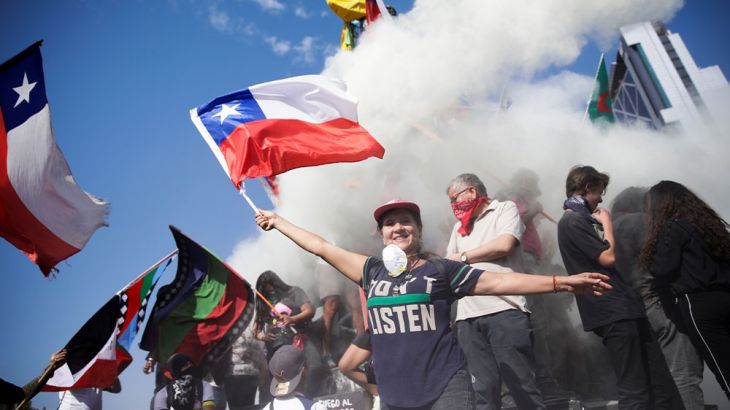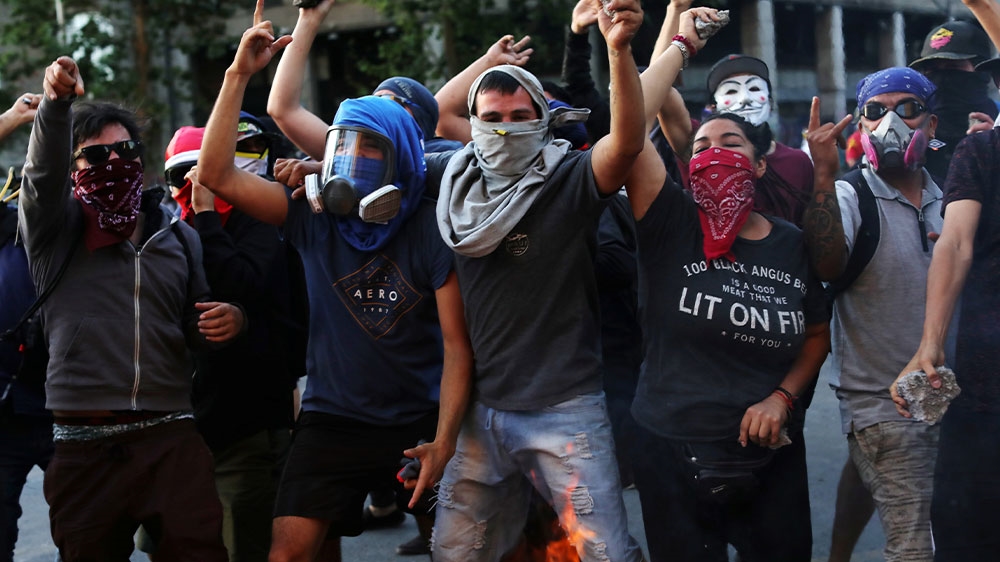Chile protesters: ‘The rich and powerful threw the first stone’
Some protesters, enraged over discrimination and inequality, increasingly believe in using force to compel the government and the elites, to listen.

Santiago, Chile – Looting and arson, attacks against police stations and police vehicles, the destruction of an ambulance, accompanied by daily protests that almost inevitably end in clashes with security forces – are making many Chileans feel that public security is out of control.
That feeling was underscored late last month when President Sebastian Pinera addressed the nation, saying he was sending an urgent bill to Congress that requests the army be allowed to safeguard key installations and police stations without the need to declare a state of emergency.
Keep reading
list of 4 itemsChileans vote in historic referendum on constitution
Total lockdown for Chile capital after surge in virus cases
How quarantined Chileans are keeping their protest movement alive
The government says that an about one-third of the estimated $1.5bn worth of destruction since protests began on October 18, was caused by criminal gangs, common criminals, drug traffickers and anarchists.
But this does not explain where the rest of the violent reactions on the streets. One thing that is obvious just by reading the enormous amount of graffiti here in Santiago is that many people feel enraged.
“Accumulate fury,” reads one message, “keep going until dignity becomes normal,” says another, “make the cuicos (the rich) shiver.”

For the vast majority, the anger over social exclusion and inequality has been expressed without violence. But there is another, increasingly more visible group, that believes that the only way to guarantee the economic and political changes that Chileans are demanding, requires violence.
“Those stupid demonstrations and marches that peaceful protesters have been carrying out for 30 years have achieved nothing,” says a protester who requested to be referred to as Mario, not his real name.
He is a 25-year-old father of a toddler who had just lost his job as an assistant accountant on the day we met him and his “comrade in the struggle”, 23-year-old Maria, also not her real name.
They live in La Pintana, a poor working-class neighbourhood located on the outskirts of south Santiago, an area with high unemployment, low-income jobs, substandard social services and drug trafficking.
After some coaxing, they agreed to talk to me.
“We need to shake the elite our of their comfort zone. We need them to feel fear. That is the only way to force them to take action,” says Maria.
“The rich and powerful are the ones who’ve thrown the first stone. They discriminate against us, despise us, leave us without education and healthcare. That’s much more violent than destroying a bus, throwing stones or writing graffiti on a wall.”
Maria and Mario represent a degree of anger, frustration and class resentment that many better off Chileans never thought existed in a country that up until October, was widely considered one of Latin America’s success stories.

Maria Olga is a professional who says she has worked hard all of her life to be able to live comfortably in one of Santiago’s upper-middle-class neighbourhoods.
“Those people who are causing so much destruction can’t be Chileans, I don’t recognise this country,” she says.
Maria and Mario say that this is because they have been invisible for decades.
But while they describe themselves as “radical opponents of the system”, they insist that it has nothing to do with left- or right-wing ideology. In fact, they underscore that those who are throwing rocks and Molotov cocktails at police, and even helping to distribute the spoils of looted supermarkets, have no political affiliation.
“We aren’t asking for their jewels or gold, only basic things like a decent income for workers and basic services,” Maria says.
“When I see my mother taking my grandparents to the hospital day after day without being able to get treatment, when I see the huge differences in the standard of living between those who live in the slums and those who live uptown, in an oasis, it infuriates me to see so much injustice. We have to work three times harder just for crumbs,” she adds.
A new study shows that 58 percent of Chileans belong to the lower-middle-class or the so-called “vulnerable class” of people who cannot access their basic needs under the country’s current system.
It is a system that is widely criticised for favouring the needs of the market above those of citizens.
Apart from anger, the perception that unites many of the so-called “radicals” in the country is a deep distrust of Chile’s political institutions, as well as the political elite. And this explains why for many protesters, the government and the political parties’ attempts to create a new social contract to quell the unrest, is falling on deaf ears.
“Many of us don’t believe in voting. I don’t feel represented by any of the parties. If there was someone who would fight for our rights, then maybe yes. But they have lied so much,” Mario says.